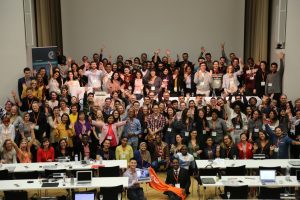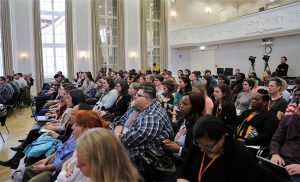
IFLA participated at OpenCon 2017 late last year, a key event in the open access, open education and open data movement. With over 10,000 applications received for the 2017 conference, IFLA was one of the lucky ones to be selected.
Thanks to the variety of the sessions’ format, the conference met the perfect balance between structure and dynamism, where participants had plenty of opportunities to listen, present and interact. One could easily find a slot to suggest discussions around a topic of his or her concern.
OpenCon brought together many enthusiastic people interested in advancing open access. Unlike other conferences, there was a real atmosphere of belonging to a big (open access) family, with sessions like story circles, where participants were brought together in small groups to each tell the story of how they got involved in open access.
Open Access worldwide and many other topics
 The formal conference sessions were built around a large number of 10-minute presentations, divided into several panels. Among other interesting interventions, Robin Champieux described her efforts and strategies to build an “open access university”, to encourage researchers to participate in the OA movement. She also insisted on the need to be critical with open access itself; because we tend to think that it is inherently good, we risk not questioning the fairness of some of its developments.
The formal conference sessions were built around a large number of 10-minute presentations, divided into several panels. Among other interesting interventions, Robin Champieux described her efforts and strategies to build an “open access university”, to encourage researchers to participate in the OA movement. She also insisted on the need to be critical with open access itself; because we tend to think that it is inherently good, we risk not questioning the fairness of some of its developments.
How can we ensure OA doesn’t just replicate the dominance of the richer countries? Denisse Albornoz underlined that, “the system is set up in such a way that we tend to hear a lot more about what is produced and what is happening in the global north and not necessarily about what is happening in the rest of the world”. Siko Bouterse also raised the very important question of “whose knowledge is still missing in our open projects”.
It was clear that open access, being present worldwide, needs to look for ways to integrate and respect linguistic and diversity. This is essential if it is to realise its social justice mission.
The Unconference sessions gave participants the possibility to engage in discussions around a specific topic. For instance, around “Best practices in open scholarly research: green, gold or hybrid”, where we considered if there was a perfect solution. For many, sticking to green, gold, hybrid or even diamond open access would mean accepting the current system with its dysfunctional origin, instead of calling for a restructure from the roots.
Librarians’ role in open access
The last day was dedicated to do-a-thons, where anyone could raise a challenge or a project, or chose to collaborate in one suggested by someone else. Together with many interesting topics, IFLA raised the challenge of “how to ensure that librarians around the world develop the full potential of the key role they play in boosting Open Access”. There are many key players in the Open Access movement, and librarians are clearly one of them. A group of around 6 people joined, and discussions moved from daily challenges that librarians face when pushing for open access, to technical questions in managing green open access repositories.
Librarians often find it hard to reach out to other faculty members to explain the importance of (green) open access. Support between librarians and academics, respectively, is important, and therefore liaison librarians have a key role. Some suggested, as a means to get researchers more interested, the possibility of underlining the positive outcomes of making research available on university repositories, such as a higher number of citations or increased accessibility to research.
Another issue is that copyright is seen as a challenge for many librarians. Some fear it, or don’t see the need of getting involved with it. It is however an important subject in a librarian’s (daily) work. Furthermore, many acknowledged how bureaucracy is a big problem when trying to influence university policies.
The conference offered a great overview of current forward-looking projects on open access from all corners of the world. It is a unique opportunity to gather people from many key areas in the open access movement to discuss and exchange information and most importantly join efforts in making open access possible around the world. With many questions unresolved and challenges to be met, the enthusiasm and optimism of the group of participants showed the energy that the movement needs.